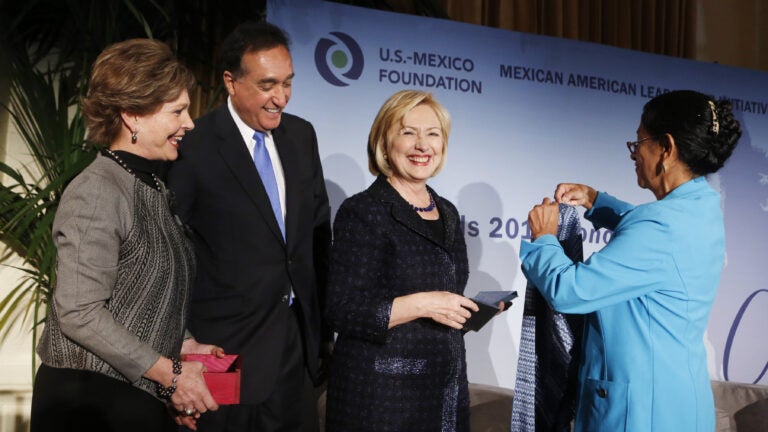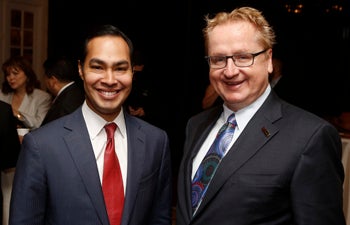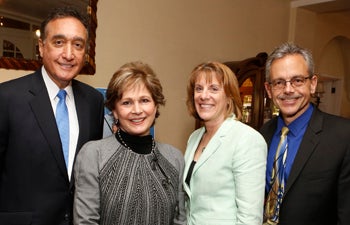
Peace, Prosperity and Progress
Hillary Rodham Clinton was a northern Illinois high school student the first time she engaged with the Mexican American community.
With church group members, she babysat children while their parents and older kids worked in the fields. The former United States Secretary of State, U.S. Senator and First Lady admitted that she did not then nor to this day speak Spanish.
“But I could see love and I could see pride and I could see gratitude no matter what language it was expressed; love in the faces of the parents and their children,” Clinton said. “I remember when the buses would drop the parents and older kids off at the end of the dusty road and the children we were watching would see their mothers, fathers, brothers and sisters, they would start running as fast as they could to be swept up in the arms of those whom they loved.”
Clinton’s mother, who grew up in Southern California and spoke some Spanish, learned that one of the mothers was looking for an affordable dress for her daughter’s First Holy Communion.
“So it became our mission with my mother in the lead to find that dress,” Clinton said.
Clinton shared these stories and more during a Nov. 9 awards ceremony at Town & Gown. Co-hosted by USC Dornsife’s Center for the Study of Immigrant Integration (CSII), the event honored Clinton with an award presented by the Mexican American Leadership Initiative (MALI) and the U.S.-Mexico Foundation.
The Hermandad Award is given to leaders who have advanced the foundation’s mission of fostering partnerships among societies of the United States and Mexico. Also present were Sen. Barbara Boxer, San Antonio Mayor Julian Castro, United Farm Workers President Arturo Rodriguez, Democratic National Committee Finance Chairman Henry Munoz and Los Angeles Councilman Gil Cedillo.
Many USC leaders attended, including USC Provost Elizabeth Garrett; USC Dornsife Dean Steve Kay; Wendy Wood, Provost Professor of Psychology and Business, and vice dean for social sciences; and CSII Director Manuel Pastor, professor of sociology and American studies and ethnicity.
Garrett said as issues related to immigration reform grow increasingly prominent in local and national policy dialogue, USC, and CSII in particular, will continue to produce consequential research that is informed by our institutional values of diversity, collaboration and support for the multiethnic communities around our campuses.
“Our university community was pleased to co-host Secretary Clinton, who has long advocated the importance of education in advancing public policy that both improves international relations and reflects our changing society,” she said.
Kay said the event was a “natural extension of USC’s DNA.”
“As the most vibrant research university in Los Angeles, we embrace our neighbors to the South as well as to the West,” Kay said. “Knowing that the Pacific Rim includes Mexico, Central America, Latin America as well as Asia, it makes perfect sense to hold this event at USC.”
Kay praised CSII for helping to identify USC and USC Dornsife as an academic hub for cross-cultural research.
“At USC Dornsife, we have faculty and students who are able to do the rigorous kinds of studies on immigrant and bi-national relations that then get driven into public policy.”

Mayor of San Antonio Julian Castro and USC Dornsife Steve Kay during the MALI event.
Pastor said the event and MALI emphasized the effort to get Mexican Americans more involved in U.S. foreign policy.
“Often diasporic communities — people who trace their roots to another country — get involved in U.S. foreign policy for their home countries but that hasn’t been as much the case for Mexican Americans,” Pastor said. “So the Mexican American Leadership Initiative is thinking through forging the transnational ties and getting Mexican Americans involved in foreign policy.
“There’s really no better way to do this than to have people like Henry Cisneros build a bridge between the U.S. and Mexico, and to have help from former Secretary of State Hillary Clinton, who launched an initiative in the State Department to engage diasporic communities. This effort also fits in well with CSII’s notion of immigrant integration as a process in which immigrants should become an important part of America — even as they maintain interests in and relationships with their former countries.”
During her address, Clinton said the idea for both the foundation and the leadership initiative grew out of the deep cultural familial and economic ties between the U.S. and Mexico.
“And the broader commitment to engage the diasporic community as engines of peace prosperity and progress,” she told the packed room.
As Secretary of State, Clinton recalled in 2011 creating the International Diaspora Engagement Alliance, which began reaching out to Caribbean Americans who had left for better opportunities but would return home each year to reconnect with family, start a business or build a house for retirement. The group reached out to people from Central America, South America, China, the Philippines and the African diaspora.
“We are so lucky as a nation that we have the talents of people everywhere,” Clinton said. “Our diversity is one of our great strengths.”
Part of the obvious argument for immigration reform is that the U.S. is a country of immigrants, she said.

Manuel Pastor, director of the Center for the Study of Immigrant Integration, which co-hosted the event (right) with Henry Cisneros, Martha Smith and USC Dornsife’s Pamela Starr.
“We should be celebrating that rather than fearing it,” Clinton said. “So I began thinking about a community that I had worked with going back so many years, and that is the Mexican American community. The contributions covered a wide array of potential opportunities: Maybe second and third generation immigrants investing in the emerging economy in their cities of origin. Or sending as we do the remittance home, but not just sending them home but looking for ways to leverage them. Giving people receiving them a better shot.”
She said she will continue to look for ways to support the foundation and MALI “to be creative, to be really invested in what we can achieve together across our borders. For example, she spoke of developing a seamless electricity grid that crosses the borders and improves economic trade.
“I personally believe we need more connectivity in North America, we need more connectivity all through our hemisphere,” she said. “The more we come together, the more we connect on trade and commerce and other kinds of important activities, the stronger we will be.”
One platform for the cross-border exchange of ideas is the U.S.-Mexico Network, housed in USC Dornsife and directed by Pamela Starr, associate professor (teaching) of international relations, who attended the event.
“The website is designed to generate bi-national communication among public intellectuals of the two societies so that they can more effectively communicate about issues of shared concern,” Starr said.